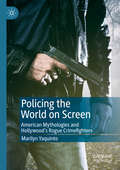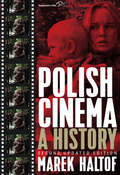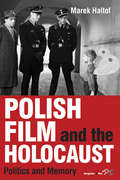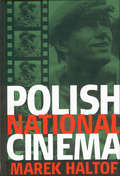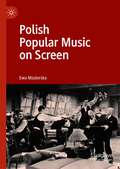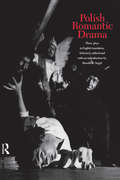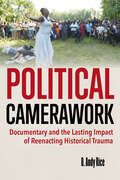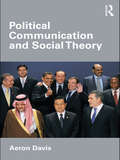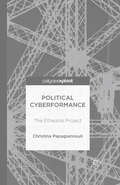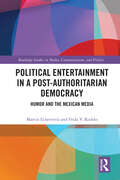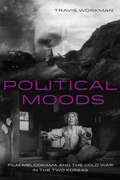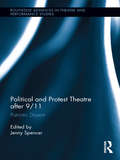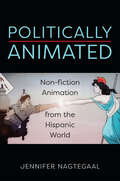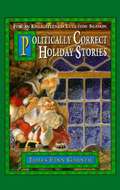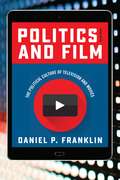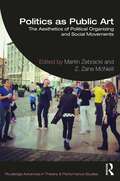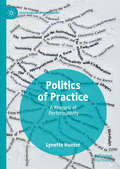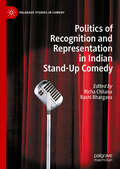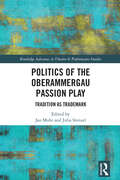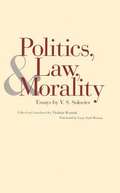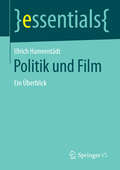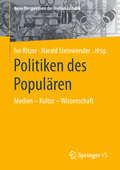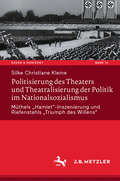- Table View
- List View
Policing the World on Screen: American Mythologies and Hollywood's Rogue Crimefighters
by Marilyn YaquintoThis book analyzes Hollywood storytelling that features an American crimefighter—whether cop, detective, or agent—who must safeguard society and the nation by any means necessary. That often means going “rogue” and breaking the rules, even deploying ugly violence, but excused as self-defense or to serve the greater good. This ends-justifies-means approach dates back to gunfighters taming the western frontier to urban cowboy cops battling urban savagery—first personified by “Dirty” Harry Callahan—and later dispatched in global interventions to vanquish threats to national security. America as the world’s “policeman often means controlling the Other at home and abroad, which also extends American hegemony from the Cold War through the War on Terror. This book also examines pioneering portrayals by males of color and female crimefighters to embody such a social or national defender, which are frustrated by their existence as threats the white knight exists to defeat.
Polish Cinema: A History
by Marek HaltofFirst published in 2002, Marek Haltof’s seminal volume was the first comprehensive English-language study of Polish cinema, providing a much-needed survey of one of Europe’s most distinguished—yet unjustly neglected—film cultures. Since then, seismic changes have reshaped Polish society, European politics, and the global film industry. This thoroughly revised and updated edition takes stock of these dramatic shifts to provide an essential account of Polish cinema from the nineteenth century to today, covering such renowned figures as Kieślowski, Skolimowski, and Wajda along with vastly expanded coverage of documentaries, animation, and television, all set against the backdrop of an ever-more transnational film culture.
Polish Film And The Holocaust
by Marek HaltofDuring World War II Poland lost more than six million people, including about three million Polish Jews who perished in the ghettos and extermination camps built by Nazi Germany in occupied Polish territories. This book is the first to address the representation of the Holocaust in Polish film and does so through a detailed treatment of several films, which the author frames in relation to the political, ideological, and cultural contexts of the times in which they were created. Following the chronological development of Polish Holocaust films, the book begins with two early classics: Wanda Jakubowska's The Last Stage (1948) and Aleksander Ford's Border Street (1949), and next explores the Polish School period, represented by Andrzej Wajda's A Generation (1955) and Andrzej Munk's The Passenger (1963). Between 1965 and 1980 there was an "organized silence" regarding sensitive Polish-Jewish relations resulting in only a few relevant films until the return of democracy in 1989 when an increasing number were made, among them Krzysztof Kieślowski's Decalogue 8 (1988), Andrzej Wajda's Korczak (1990), Jan Jakub Kolski's Keep Away from the Window (2000), and Roman Polański's The Pianist (2002). An important contribution to film studies, this book has wider relevance in addressing the issue of Poland's national memory.
Polish National Cinema
by Marek HaltofIn the years since World War II, Poland has developed one of Europe's most distinguished film cultures. However, in spite of the importance of Polish cinema this is a domain in need of systematic study. This book is the first comprehensive study of Polish cinema from the end of the 19th century to the present. It provides not only an introduction to Polish cinema within a socio-political and economic context, but also to the complexities of East-Central European cinema and politics.
Polish Popular Music on Screen
by Ewa MazierskaThis book examines the interface between Polish popular music and screen media against the background of Polish history, cinema, and popular culture and situates that interface in a local as well as global context. It looks at Polish musicals, biographical films about musicians, documentary films and, finally, music videos. The author draws attention to the immense popularity of musical comedies in Polish interwar cinema, the enduring appeal of musical genres during the period of state socialism, despite their low status in film criticism, and the re-birth of musicals in the 2010s. Mazierska also discusses the most important stars, directors and authors of songs presented in Polish films, and points to the effect of technological changes on inception and transformation of music-centred genres of screen media, including the effect of YouTube on their growth and preservation. The book is informed by the question of how parochial and universal is Polish popular music and its screen representation.
Polish Romantic Drama: Three Plays in English Translation (Polish Theatre Archives Ser. #Vol. 5)
by Harold B. SegelThis is the first volume in English to be devoted entirely to Polish Romantic drama. It contains translations of three major plays: Forefathers; Eve, Part III, by Adam Mickiewics; The Un-Divine Comedy by Zygmunt Krasinski; and Fantazy by Juliusz Slowacki. In his highly informative introduction, Professor Segel discusses the plays against the background of the Romantic movement in Poland and points out their ideological and artistic importance. As products of a revolutionary Poland; they were written and published in Paris by writers who either resettled there after the Insurrection of 1830 or otherwise identified with the Great Emigration; they are permeated with the spirit of Romantic Rebellion, with pleas for universial justice, and with queries concerning the role of the poet in society. Brillant productions of the plays in Poland in the late nineteenth and early twentieth-centuries gave impetus to an entire tradition of modern Polish theatrical experimentation as well as dramatic writing which extends to the present day.
Political Camerawork: Documentary and the Lasting Impact of Reenacting Historical Trauma
by D. Andy RiceWhat mental and physical distress do actors, camerapersons, and reporters experience when working on reenactments of traumatic moments in history? In Political Camerawork, D. Andy Rice theorizes that the intense feelings produced while creating these performed scenarios, called "simulation documentaries," connect difficult pasts to the present. Building on his background as a nonfiction film director, producer, editor, and cinematographer, Rice analyzes performance techniques to gain insight into the emotional toll of simulation documentaries, including those reliving the Vietnam War, the US military's embodied training in California during the Iraq War, and an annual quadruple lynching reenactment organized by Black civil rights activists in Georgia.Investigating the lasting impact of these productions, Political Camerawork reveals that, by performing a simulation of a traumatic event they didn't directly experience, those involved become carriers of the trauma.
Political Communication and Social Theory (Communication and Society)
by Aeron DavisPolitical Communication and Social Theory presents an advanced and challenging text for students and scholars of political communication and mass media in democracies. It draws together work from across political communication, media sociology and political sociology, and includes a mix of theoretical debate and current examples from several democratic media systems. Its wide ranging discussions both introduce and contest the traditional scholarship on a number of contemporary topics and issues. These include: comparative political and media systems theories of democracy, representation and the public sphere political party communication, marketing and elections the production of news media and public policy media sociology and journalist-source relations celebrity politics, popular culture and political leadership new media and online democracy national-global politics and international political communication foreign policy-making, war and media the crisis of public communication in established democracies. At the same time, Political Communication and Social Theory also offers a fascinating investigation of the causes of crisis in established political and media systems. In today’s democracies, trust in politicians, state institutions and mainstream media sources has dropped to new lows. The traditional business model that sustained journalism is failing and nations are struggling to respond to the existing global recession and impending environmental and resource crises. Drawing on interviews with over 100 experienced politicians, journalists and civil servants, Aeron Davis explores how the varied political actors and communicative processes, at the centre of UK democracy, may or may not be contributing to such crisis tendencies.
Political Communication in Postmodern Democracy
by Katrin Voltmer Kees BrantsThis book explores the changing relationship between politics, the media and citizens. Based on comparative evidence from the UK and the Netherlands it provides new insights into the dynamics of political communication in post-modern democracy, which is characterized by uncertainty about the location of politics and an erosion of grand narratives and political ideologies. The contributions of this volume aim to understand these changes as a two-dimensional process: the horizontal dimension encompasses the shifting power balance between politicians and the media. The vertical dimension explores how new forms of citizenship and the pervasiveness of popular culture alongside new communication technologies are challenging the authority of both established journalism and institutionalized politics. What emerges is a complex picture of politicization and de-politicization, elite dominance and the power of vox populi, mediatisation and effective control of political elites over the public agenda.
Political Cyberformance: The Etheatre Project
by Christina PapagiannouliWritten from a practice-based perspective, this book focuses on the political character of 'cyberformance': the genre of digital performance that uses the Internet as a performance space. The Etheatre Project comprises a series of experimental cyberformances aiming to reconsider the characteristics of theatre in the Internet age.
Political Entertainment in a Post-Authoritarian Democracy: Humor and the Mexican Media (Routledge Studies in Media, Communication, and Politics)
by Martin Echeverria Frida V. RodeloThe book offers an analytical and empirical account of the specificities of political entertainment in post-authoritarian democracies. Centered around Mexico as a case study, the book explores the production of political entertainment in post-authoritarian legacy media and how political and economic conditions constrain the range and edge of discourse; how political entertainment in social media is shaped by the structure of platforms, as creators are encouraged to conform to specific norms such as constant publication; and the impacts of these media on attitude formation among the population. The book proposes a theoretical framework for identifying the specific conditions of post-authoritarian democracies that constrain the production of political entertainment, as well as its outcomes in terms of content and effects. This framework can be applied to the analysis of similar case studies, particularly in the Global South at large. With an analysis drawing on hard data, historical accounts, and anecdotal evidence, this volume will resonate within academic communities interested in political communication, media studies, transitional democracies, and popular culture.
Political Moods: Film Melodrama and the Cold War in the Two Koreas (Global Korea #4)
by Travis WorkmanA free ebook version of this title is available through Luminos, University of California Press's Open Access publishing program. Visit www.luminosoa.org to learn more. Melodrama films dominated the North and South Korean industries in the period between liberation from Japanese colonial rule in 1945 and the hardening of dictatorship in the 1970s. The films of each industry are often read as direct reflections of Cold War and Korean War political ideologies and national historical experiences, and therefore as aesthetically and politically opposed to each other. However, Political Moods develops a comparative analysis across the Cold War divide, analyzing how films in both North and South Korea convey political and moral ideas through the sentimentality of the melodramatic mode. Travis Workman reveals that the melancholic moods of film melodrama express the somatic and social conflicts between political ideologies and excesses of affect, meaning, and historical references. These moods dramatize the tension between the language of Cold War politics and the negative affects that connect cinema to what it cannot fully represent. The result is a new way of historicizing the cinema of the two Koreas in relation to colonialism, postcolonialism, war, and nation building.
Political and Protest Theatre after 9/11: Patriotic Dissent (Routledge Advances in Theatre & Performance Studies)
by Jenny SpencerThis collection documents and examines political and protest theatre produced between the 9/11 attacks in 2001 and Obama’s election in 2008 by British and American artists responding to their own governments’ actions and policies during this time. The plays take up topics such as the ongoing wars on terror, Blair’s support of U.S. policies, the flawed intelligence that led to the Iraq war, and illegal detentions and torture at Abu Ghraib. The authors argue that engaged artists faced a radically different sociopolitical context for their work after 9/11 compared to earlier social protest movements and new forms of theatre, and different emotional strategies were necessary to meet the challenges. The subtitle Patriotic Dissent suggests the double stance of many artists-- influenced by patriotic expressions of national solidarity, yet critical of the ways that patriotic language was put to use against others. The articles represent a broad range of theatre: Broadway musicals, documentary theatre, adaptations of classical theatre, new plays by British playwrights, street performances and installations, and musical concerts. The contributors’ case studies evaluate the effectiveness of important instances of political theatre and protest from this decade, arguing for the significance, relevance, and continuing necessity for evolving forms of political theatre today.
Politically Animated: Non-fiction Animation from the Hispanic World (Toronto Iberic)
by Jennifer NagtegaalPolitically Animated studies the convergence of animation and actuality within films, television series, and digital shorts from across the Spanish-speaking world. It interrogates the many ways in which animation as a stylistic tool and storytelling device participates in political projects underpinning an array of non-fiction works. The case studies in the book cover a diverse geographical scope, including Spain, Argentina, Colombia, and Mexico. They critically analyse different works such as feature-length animated documentary films, a work of animated journalism, a short animated essay, and micro-short episodes from a televised animated documentary series. Jennifer Nagtegaal employs the term "politically animated" in reference to the ideological implications of choosing specific techniques and styles of animation within certain socio-historical and cultural contexts. Nagtegaal illuminates the creative union of animated documentary and the comics medium currently being exploited by Spanish and Latin American cartoonists and filmmakers alike. By paying particular attention to cultural production beyond the big screen, Politically Animated continues to stretch the bounds of animated documentary scholarship.
Politically Correct Holiday Stories: For an Enlightened Yuletide Season
by James Finn GarnerFive Holiday Stories ('Twas the Night Before Solstice, Frosty the Persun of Snow, The Nutcracker, Rudolph the Nasally Empowered Reindeer and A Christmas Carol) are re-written in a politically correct format. This different twist is hysterical and a must read!
Politics and Film: The Political Culture of Television and Movies (Second Edition)
by Daniel P. FranklinPolitics and Film examines popular movies and television shows as indicators of social and political trends to explore the political culture of the United States. Updated to include the popular and controversial movies and shows American Sniper, House of Cards, Orange Is the New Black, and Twelve Years a Slave, the second edition investigates popular conceptions of government, the military, intelligence and terrorism, punishment and policing, and recognizes mistakes or dark times in our shared history.
Politics as Public Art: The Aesthetics of Political Organizing and Social Movements (Routledge Advances in Theatre & Performance Studies)
by Martin Zebracki Z. Zane McNeillPolitics as Public Art presents a keystone collection that pursues new frameworks for a critical understanding of the relationship between public art and protest movements through the utilization of socially engaged and choreopolitical approaches. This anthology draws from a unique combination of interdisciplinary scholarship and activism where it integrates geographically rich perspectives from political and grassroots community contexts spanning the United States, Europe, Australia, and Southeastern Africa. The volume questions, and reimagines, not only how public art practice can be integral to politics, including forms of surveillance and control of bodily movement. It also probes into how political participation itself can be construed as a form of public artmaking for radical social change and just worlds. This collection advocates for scholar-activist inquiry into how socially engaged public art practices can pave the way for thinking through—and working toward—championing more inclusive futures and, as such, choreographing greater intersectional justice. This book provides a wide appeal to audiences across humanities and social science scholarship, arts practice, and activism seeking conceptual and empirically informed tools for moving from public art and choreopolitical theory into modes of praxis: critical reflection and action.
Politics of Practice: A Rhetoric of Performativity (Performance Philosophy)
by Lynette HunterThis book discusses affective practices in performance through the study of four contemporary performers – Keith Hennessy, Ilya Noé, Caro Novella, and duskin drum – to suggest a tentative rhetoric of performativity generating political affect and permeating attempts at social justice that are often alterior to discourse. The first part of the book makes a case for the political work done alongside discourse by performers practising with materials that are not-known, in ways that are directly relevant to people carrying out their daily lives. In the second part of the book, four case study chapters circle around figures of irresolvable paradox – hendiadys, enthymeme, anecdote, allegory – that gesture to what is not-known, to study strategies for processes of becoming, knowing and valuing. These figures also shape some elements of these performances that make up a suggested rhetorical stance for performativity.
Politics of Recognition and Representation in Indian Stand-Up Comedy (Palgrave Studies in Comedy)
by Rashi Bhargava Richa ChilanaThis book, first of its kind in the Indian context, brings together both a theoretical understanding of various aspects of the humour, aesthetics and politics of stand-up comedy, and case studies of various forms of stand-up comedy in India. This volume is interdisciplinary wherein the contributors raise pertinent issues about the role of stand-up comedy in India in contemporary times. With an increased presence of OTT platforms and internet penetration that allows for easy access to this art form, stand-up comedy in India cannot be ignored anymore. The book includes chapters on Indian stand-up comedy related to the themes of: interrogating the term ‘Indian stand-up comedy’; historical lineage of stand-up in India; the politics of language and laughter; ‘charged humour’ vs ‘safe’/profitable comedy; stand-up comics as parrhesiastes, performance of the self and comic personas; comedy and other forms of artistic expression; laughter clubs, urbanism and stand-up comedy; surveillance, censorship and trolling; the economy of production and consumption of stand-up comedy and the ‘silences’ and limitations in the contemporary form of stand-up in India.
Politics of the Oberammergau Passion Play: Tradition as Trademark (Routledge Advances in Theatre & Performance Studies)
by Jan Mohr Julia StenzelThis collection provides a comprehensive overview of the Oberammergau Passion play and its history from the 19th century onwards. Specialists in theatre and performance studies, comparative literature, theology, political studies, history, and ethnology initiate an interdisciplinary discussion of how Oberammergau has built a trademark from tradition. A typological and historical outline of this development is followed by detailed analyses of the blending of spaces, temporalities, and cultures, through which Oberammergau as an institution is stabilized while at the same time remaining open to the dynamics of historical change. The authors comprise the formation of a theatrical public sphere, literary imaginations, and layers of authenticity in modern practices of distributed communication that culminate in the notion of tradition as trademark. This collection is analysed from a wide spectrum of cultural historical perspectives, ranging from literary studies, theatre and performance studies to theology, political studies, and ethnology.
Politics without Stories
by David RicciLiberal candidates, scholars, and activists mainly promote pragmatism rather than large and powerful narratives - which may be called 'alpha stories' for their commanding presence over time. Alternatively, conservative counterparts to such liberals tend to promote their policy preferences in alpha stories praising effective markets, excellent traditions, and limited government. In this face-off, liberals represent a post-Enlightenment world where many modern people, following Max Weber, are 'disenchanted', while many conservatives, echoing Edmund Burke, cherish stories borrowed from the past. Politics without Stories describes this storytelling gap as an electoral disadvantage for liberals because their campaigning lacks, and will continue to lack, the inspiration and shared commitments that great, long-term stories can provide. Therefore, Ricci argues that, for tactical purposes, liberals should concede their post-Enlightenment skepticism and rally around short-term stories designed to frame, in political campaigns, immediate situations which they regard as intolerable. These may help liberals win elections and influence the course of modern life.
Politics, Law and Morality: Essays By V. S. Soloviev
by Vladimir Soloviev Vladimir WozniukConsidered one of Russia's greatest philosophers, Vladimir Soloviev (1853-1900) was also a theologian, historian, poet, and social and political critic. His works have emerged to enjoy renewed attention in post-Soviet Russia, and his concerns echo in contemporary discussions of politics, law, and morality. In this collection of Soloviev's essays -- many translated into English for the first time -- the philosopher explores an array of social issues, from the death penalty to nationalism to women's rights. Soloviev reacts against the tradition of European rationalist thought and seeks to synthesize religious philosophy, science, and ethics in the context of a universal Christianity. In these writings he reveals the centrality of human rights in his Christian world-view, not only as an abstract theory but also as an inspiration in everyday life. In a substantive introduction and copious annotations to the essays, Vladimir Wozniuk points out distinctive and often overlooked features of Soloviev's works while,illuminating his place within both the Russian and Western intellectual traditions.
Politik und Film: Ein Überblick (essentials)
by Ulrich HamenstädtDieses Essential bietet einen Überblick zu unterschiedlichen Interpretationen der Verbindung zwischen Politik und Film. Filme und Fernsehserien werden dabei als wichtige Darstellungsformen von Politik begriffen. In zahlreichen Formaten wird dies in den letzten Jahren deutlich. Interessant wird es jedoch, wenn Filme und Serien nicht den Anspruch erheben politisch zu sein, dies jedoch implizit sind. Denn Filme spielen zum einen immer mit Vorannahmen des Publikums, produzieren andererseits aber auch spezifische politische Annahmen und Weltanschauungen bei ihrem Publikum. So sind beispielsweise Ängste oder gesellschaftlich verbreitete Feindbilder für die Wirkung von Filmen bedeutungsvoll. James Bond bekommt heute keine Liebesgrüße mehr aus Moskau, dafür rücken Cyberangriffe und die zunehmende Macht Chinas in den Mittelpunkt der Filmreihe.
Politiken des Populären: Medien – Kultur – Wissenschaft (Neue Perspektiven der Medienästhetik)
by Ivo Ritzer Harald SteinwenderDer Band befragt populäre Kultur auf ihre politischen Implikationen in medialen Erscheinungsformen. Dabei problematisiert er die tradierte Dichotomie von „Kunst“ und „Pop“, um den Fokus auf offene Forschungsfragen globaler Wechselwirkungen zu legen und über die akademischen Disziplinen hinaus zu erweitern. Die einzelnen Beiträge des Bandes nähern sich dem Untersuchungsgegenstand anhand mehrerer Konfliktlinien, die ein Themenspektrum von Fragen der Ideologie, Postkolonialität und Queerness populärer Medienkulturen eröffnen. Der InhaltMediale Regimes und Populärkultur ● Genre, Gesellschaft und Politik ● Gender und RaceDie HerausgeberProf. Dr. Ivo Ritzer lehrt Medienwissenschaft an der Universität Bayreuth. Dr. Harald Steinwender ist Redakteur im Programmbereich Spiel – Film – Serie des Bayerischen Rundfunks und Programmplaner für das BR Fernsehen.
Politisierung des Theaters und Theatralisierung der Politik im Nationalsozialismus: Müthels „Hamlet“-Inszenierung und Riefenstahls „Triumph des Willens“ (Szene & Horizont. Theaterwissenschaftliche Studien #13)
by Silke Christiane KleineVorliegende Arbeit beschäftigt sich mit den Fragen nach der Politisierung der Bühne während des „Dritten Reiches“ und der Nutzbarmachung theatraler Operativität für die politische nationalsozialistische Massenversammlung anhand der Analysen einer massenwirksamen Hamlet-Inszenierung (Lothar Müthel, Berlin 1936) und von Leni Riefenstahls filmischer Dokumentation des „Reichsparteitags der Einheit und Stärke“ 1934 („Triumph des Willens“). Während sich das Medium der Theaterbühne als nicht sonderlich fruchtbar für propagandistische Zwecke erwiesen hatte, ereignete sich das „eigentliche“ Theater des „Dritten Reiches“ auf den Plätzen und in den Arenen des politischen Massenauftritts. Es geschah also ein Transfer theatraler Mittel und Operativität hin zu öffentlichen Massenveranstaltungen des Regimes. Theatrale, dramaturgische Elemente der Theaterbühne erwiesen sich in Kombination mit massenpsychologischen Grundmechanismen als besonders tragfähig, sodass man sagen kann, dass es sich bei NS-tendenziösen Theaterinszenierungen um Präfigurationen des politischen Massenauftritts handelte. Dies wird anhand öffentlicher Veranstaltungen im Nationalsozialismus erörtert; diese werden im Hinblick auf theatrale Kategorien wie der Ausgestaltung/Architektur des Raumes, Auditivität (Stimme und Rede, die Rolle der Lautsprechertechnologie), Licht/Beleuchtung und Requisiten analysiert. Neben diesen Aspekten der Theaterregie kamen (hier: pseudo-) religiöse Aspekte der Kirchenregie zum Tragen. Leni Riefenstahls filmische Dokumentation „Triumph des Willens“ zeigt eindrücklich die Kulmination der bis dato in vielen Auftritten erprobten massenpsychologischen Dramaturgie im Großereignis von Nürnberg. Zudem entgrenzt Riefenstahl das Ereignis durch die Reproduzierbarkeit des Mediums „Film“. Einerseits stellt der Film den Initiationsprozess für die jungen Nationalsozialisten auf dem „Reichsparteitag“ in Nürnberg dar, andererseits war die „Lektüre“ des Films gleichsam ein Initiationsprozess für den Zuschauer; das filmische Zeugnis Leni Riefenstahls konnte so die Präsenzteilnahme am „Reichsparteitag der Einheit und Stärke“ ersetzen.
